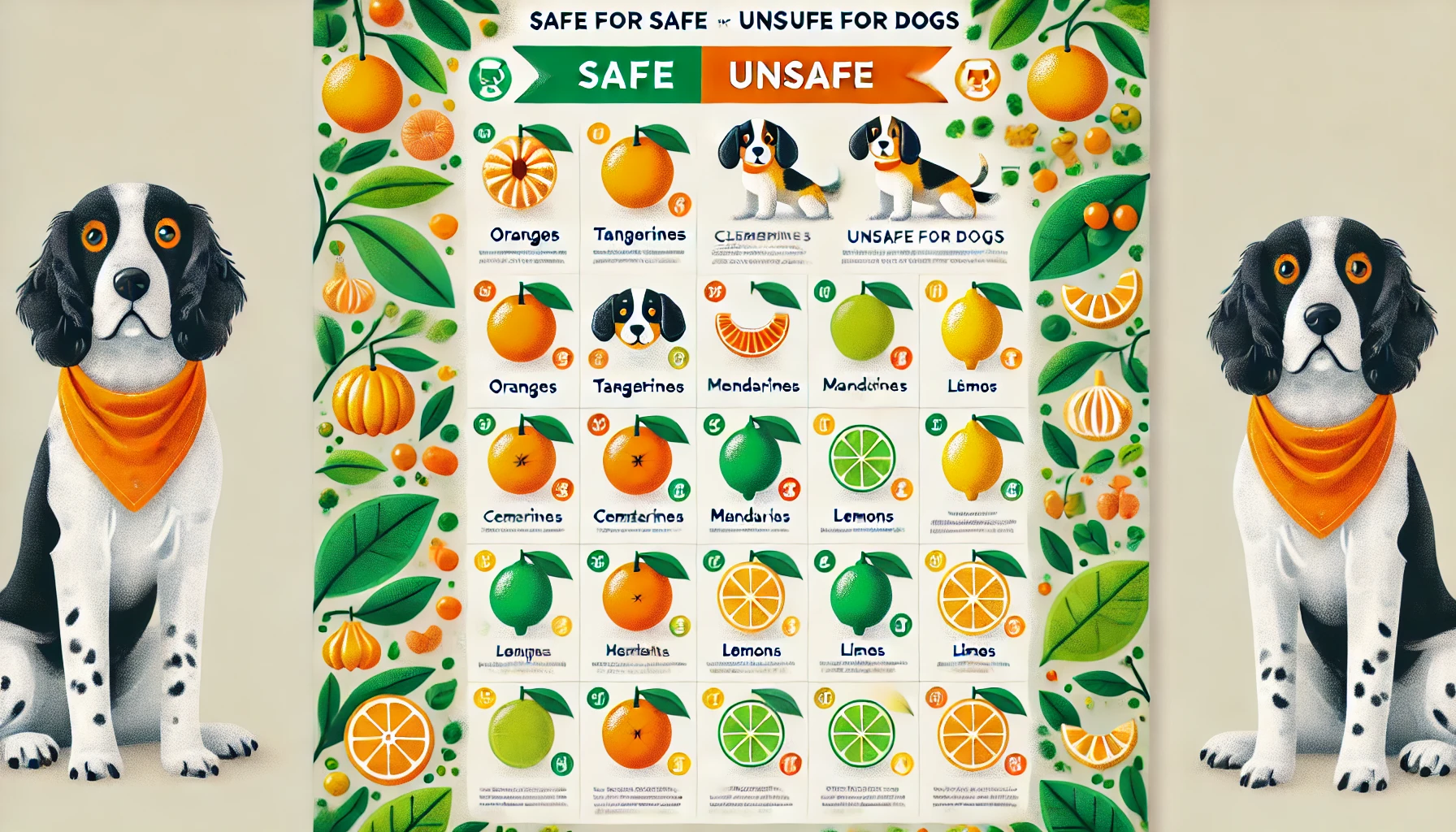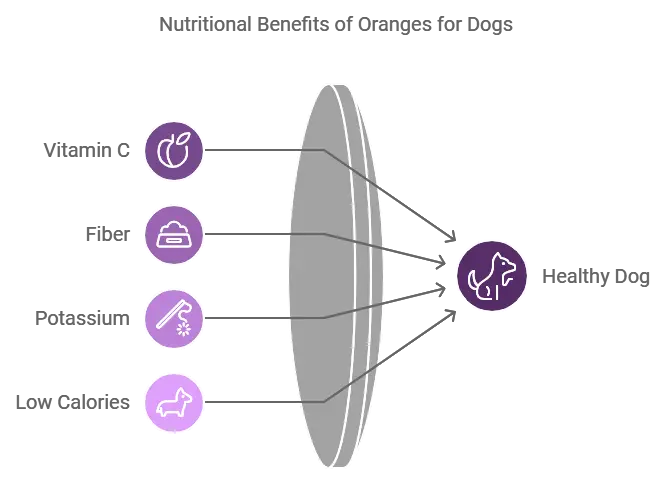Can Dogs Eat Oranges? 7 Facts Every Dog Owner Must Know

Can dogs eat oranges? Yes, but in moderation. Oranges are safe for dogs to eat in small amounts and can provide some health benefits. However, not all citrus fruits are suitable for dogs, and large quantities can cause digestive issues.
Oranges contain essential nutrients like vitamin C and fiber, but their high sugar content requires careful portion control. Other citrus fruits such as tangerines, mandarins, and clementines also raise questions about safety. This article will explore whether oranges and related fruits are healthy for dogs and how to feed them safely.
Nutritional Benefits of Oranges for Dogs
Oranges offer several health benefits for dogs when given in moderation. They contain:
- Vitamin C: Boosts immunity and helps with stress-related oxidation.
- Fiber: Supports digestion and prevents constipation.
- Potassium: Maintains muscle function and heart health.
- Low in Calories: Makes it a suitable occasional snack for active dogs.
Though dogs can produce their own vitamin C, certain conditions like stress or illness may reduce natural production. Small amounts of oranges can supplement their diet during such times. However, high sugar content makes oranges unsuitable for overweight or diabetic dogs.

Potential Risks: Are Oranges Bad for Dogs?
While oranges are safe in small amounts, there are some risks to consider:
- Digestive Issues:
- Eating too many oranges can lead to vomiting, diarrhea, or stomach pain.
- The acidity of citrus fruits may cause discomfort, especially in sensitive dogs.
- High Sugar Content:
- Oranges contain natural sugars, which can contribute to weight gain and increase blood sugar levels in diabetic dogs.
- Limit citrus consumption if your dog is overweight or prone to obesity.
- Orange Peels and Seeds:
- Peels are not toxic but are hard to digest, potentially causing choking or intestinal blockages.
- Seeds, though rare in seedless varieties, should be avoided to prevent obstruction.
It’s essential to serve oranges without peels and in controlled amounts. Offering too much can lead to more harm than good.
Key Point
Yes, dogs can eat oranges in small quantities, but too much citrus can cause digestive issues.
Can Dogs Eat Other Citrus Fruits?
Besides oranges, other citrus fruits are popular, but not all are equally safe for dogs. Here’s what you need to know:
- Can Dogs Eat Tangerines?
Yes, dogs can eat tangerines, but they have a higher sugar content than regular oranges. Offer small portions to avoid weight gain or stomach upset. - Can Dogs Eat Mandarins?
Mandarins are safe for dogs but should be given occasionally. Too many can cause loose stools due to their acidity. - Can Dogs Eat Clementines?
Clementines are similar to oranges and are safe in small amounts. However, limit them to one or two slices to avoid overfeeding. - Can Dogs Have Halos or Cuties?
Halos and Cuties are branded mandarins or clementines. They’re safe as long as the peels are removed and seeds are avoided. - Can Dogs Eat Orange Peels?
No. Peels are hard to digest and can lead to intestinal issues. Always serve citrus fruits peeled.
Each citrus fruit, while generally safe, should be given in moderation to avoid sugar overload or digestive issues.
How to Feed Oranges Safely to Dogs
To avoid health risks, follow these tips when giving oranges or other citrus fruits to your dog:
- Portion Control
- Offer 1-2 slices for small dogs and 2-3 slices for medium or large dogs.
- Avoid overfeeding, as too much citrus can lead to stomach upset.
- Remove Peels and Seeds
- Always peel oranges and check for seeds to prevent choking or digestive blockages.
- Avoid feeding orange peels, as they are tough and hard to digest.
- Introduce Citrus Gradually
- Start with a small piece to see if your dog tolerates the fruit well. Some dogs might be sensitive to citrus acids.
- Don’t Offer Orange Juice
- Orange juice is high in sugar and lacks fiber, which can spike blood sugar and harm diabetic dogs.
- Use as an Occasional Treat
- Oranges are best used as an occasional reward, not a daily snack. Stick to regular dog food for most of their nutrition.
For Your Information
A dog broken nail can be a painful and stressful experience for both you and your pet. Acting quickly with proper first aid—such as stopping the bleeding, cleaning the wound, and monitoring for infections—helps ensure a smooth recovery.
Are Oranges Toxic to Dogs?
No, oranges are not toxic to dogs, but they can cause problems if eaten in large amounts. The following risks are associated with improper feeding:
- Citrus Oils and Peel Compounds
- While not poisonous, orange peels contain oils that are difficult to digest. These can lead to vomiting and diarrhea if consumed.
- Sugar Overload
- Excess sugar can contribute to weight gain, dental problems, and worsen conditions like diabetes. It’s essential to limit citrus fruit portions.
- Large Quantities of Citrus Fruits
- Eating too many oranges or other citrus fruits can upset your dog’s stomach. Symptoms like bloating, lethargy, or diarrhea may occur.
- Orange Juice and Toxic Myths
- Pure orange juice is not toxic, but it’s too sugary and lacks the fiber found in whole fruit. Stick to fresh slices over juice to avoid digestive issues.
In moderation, oranges are safe for dogs, but always monitor their intake to prevent side effects.

Safe and Unsafe Citrus Fruits for Dogs
Here’s a quick overview of which citrus fruits are safe for your dog and which ones you should avoid:
| Fruit | Safe for Dogs? | Notes |
|---|---|---|
| Oranges | Yes, in moderation | Avoid peels and seeds. |
| Tangerines | Yes, in moderation | High sugar content; limit portions. |
| Clementines | Yes, in moderation | Stick to small amounts. |
| Mandarins | Yes, in moderation | May cause stomach upset if overfed. |
| Orange Peels | No | Hard to digest; may cause blockages. |
| Orange Juice | No | Too much sugar; lacks fiber. |
| Grapefruit | No | Too acidic and can cause stomach issues. |
| Lemons | No | Too sour and may irritate the stomach. |
| Limes | No | Contains compounds that can be toxic. |
What to Do If a Dog Eats Too Many Oranges
If your dog consumes too many oranges or other citrus fruits, watch for the following symptoms:
- Vomiting
- Diarrhea
- Abdominal discomfort (whining, bloating)
- Lethargy or restlessness
Steps to Take
- Remove Any Leftover Fruit
- If your dog is still eating, stop them immediately and remove any orange peels or remaining slices.
- Monitor Symptoms
- Mild symptoms like soft stools may pass within a few hours.
- If vomiting or diarrhea persists for over 24 hours, contact your veterinarian.
- Provide Water
- Dehydration is a risk with diarrhea, so make sure your dog has access to plenty of water.
- Call the Vet if Needed
- If your dog shows severe symptoms like constant vomiting, bloating, or weakness, contact a vet immediately.
- Avoid Feeding Citrus Until Recovery
- Give your dog time to recover before reintroducing any citrus fruit, even in small portions.
Conclusion
So, can dogs eat oranges? Yes, but only in moderation. Oranges can provide your dog with vitamin C, fiber, and hydration, but the high sugar content makes it important to limit portions. Avoid feeding orange peels and seeds, as they can cause digestive issues. Other citrus fruits like tangerines, mandarins, and clementines are also safe in small quantities, while fruits like lemons, limes, and grapefruit should be avoided.
Always introduce citrus fruits slowly and monitor your dog for any signs of discomfort. When given as an occasional treat, oranges can be a healthy addition to your dog’s diet, but the key is balance and careful portioning.
FAQs
1. Can dogs eat orange peels?
No, orange peels are difficult to digest and may cause choking or blockages. Always remove the peel before offering oranges to your dog.
2. Are oranges poisonous to dogs?
No, oranges are not poisonous to dogs. However, large amounts can cause digestive upset, so feed them in moderation.
3. Can puppies eat oranges?
Yes, puppies can eat small amounts of oranges, but their stomachs are more sensitive. Introduce citrus fruits slowly and watch for any adverse reactions.
4. Can dogs eat tangerines?
Yes, tangerines are safe for dogs, but their higher sugar content requires limited feeding to avoid weight gain.
5. Is orange juice safe for dogs?
No, orange juice is not recommended. It contains too much sugar and lacks the fiber found in whole oranges.
6. What happens if my dog eats too many oranges?
Overeating oranges can lead to vomiting, diarrhea, and bloating. If symptoms persist for more than a day, contact your veterinarian.
7. Can dogs have clementines or mandarins?
Yes, both are safe for dogs in small portions. Always remove the peels and limit the number of slices to avoid digestive issues.






